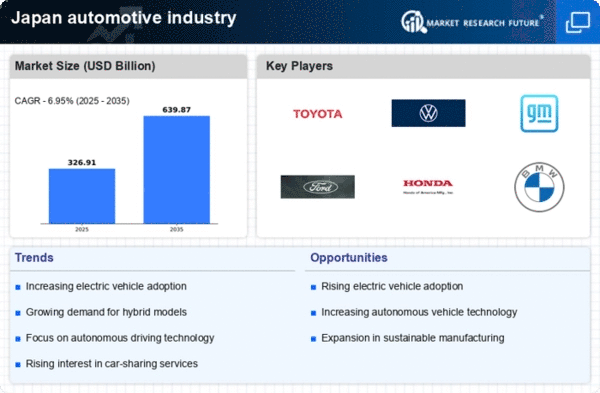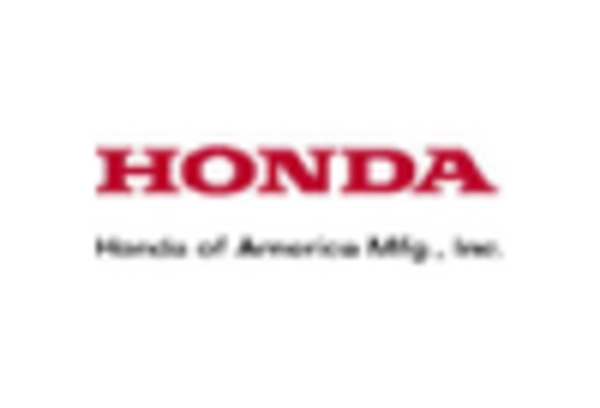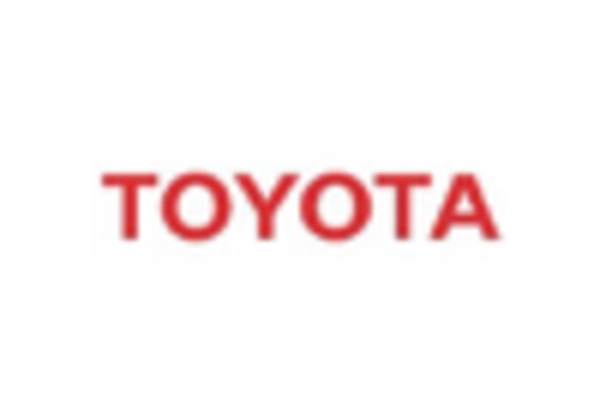Shifts in Consumer Demographics
Shifts in consumer demographics are significantly influencing the automotive industry market in Japan. The aging population is leading to a demand for vehicles that offer enhanced safety features and ease of use. Additionally, younger consumers are showing a preference for mobility solutions over traditional vehicle ownership, which is prompting manufacturers to explore alternative business models such as car-sharing and subscription services. This demographic shift is likely to alter the types of vehicles produced and marketed, as companies adapt to the evolving needs and preferences of different age groups. Consequently, the automotive industry market must remain agile to address these changing consumer dynamics.
Rising Demand for Sustainable Practices
There is a growing demand for sustainable practices within the automotive industry market in Japan. Consumers are increasingly aware of environmental issues and are seeking vehicles that align with their values. This shift is prompting manufacturers to adopt eco-friendly materials and production methods. For example, the use of recycled materials in vehicle production has increased by 15% in recent years. Additionally, companies are investing in carbon-neutral initiatives to appeal to environmentally conscious consumers. This trend not only influences purchasing decisions but also compels manufacturers to innovate, thereby shaping the future landscape of the automotive industry market.
Government Incentives for Electric Vehicles
The Japanese government actively promotes the adoption of electric vehicles (EVs) through various incentives, which significantly impacts the automotive industry. These incentives include subsidies for EV purchases, tax reductions, and investments in charging infrastructure. As of 2025, the government aims to have 1.5 million EVs on the road, which represents a substantial increase from previous years. This push not only encourages consumers to transition to EVs but also stimulates manufacturers to innovate and expand their electric offerings. The automotive industry market in Japan is thus experiencing a shift towards sustainable mobility, driven by favorable policies that support both consumers and manufacturers.
Technological Advancements in Manufacturing
Technological advancements in manufacturing processes are reshaping the automotive industry market in Japan. Automation, robotics, and artificial intelligence are increasingly integrated into production lines, enhancing efficiency and reducing costs. For instance, the adoption of Industry 4.0 technologies has led to a 20% increase in production efficiency for several major manufacturers. This trend allows companies to respond more swiftly to market demands and consumer preferences, ultimately improving competitiveness. Furthermore, these innovations facilitate the production of more complex and high-quality vehicles, which is essential in a market that values precision and reliability.
Urbanization and Infrastructure Development
Urbanization in Japan is driving changes in the automotive industry market, as cities expand and infrastructure develops. The increasing population density in urban areas leads to a demand for compact and efficient vehicles. Moreover, the government is investing in smart city initiatives, which include the development of intelligent transportation systems. These systems aim to improve traffic flow and reduce congestion, thereby influencing consumer preferences towards vehicles that are compatible with such technologies. As a result, manufacturers are focusing on producing vehicles that cater to urban lifestyles, which is likely to reshape the automotive industry market in the coming years.
















